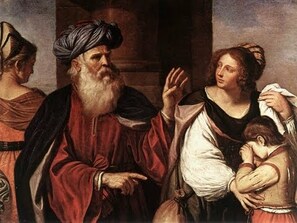|
1/28/2019 Sarah and Ishmael: A love story Over the centuries stepmothers have generally gotten a bad rap. Fairytales casting poor, beautiful children opposite nasty, vengeful step-parents, haven't much helped to break the negative stereotype. Think of Julia Roberts in an updated take on the story of Snow White. Now I love Julia and thoroughly enjoyed seeing her in all her nasty glory on the big screen. But given a choice of which of her films best portrays the realities of step-parenting, I would mostly likely vote for "Stepmom" (1998). In this story, two women, played by Susan Sarandon and Julia, struggle with their respective parenting and step-parenting roles. Both learn painful, and sometimes funny, lessons and ultimately discover that what counts in parenting is an unselfed love. Step-parenting is not an easy role. In many cases, there is a lot of baggage when co-parenting children of divorce, or those who have lost or been separated from a parent. It would be helpful to see more examples of the love that can guide a step-parent through difficult situations, so that ultimately children grow up feeling whole and ready to fulfil their individual missions. Here, the Bible can be a help. Now, I know that the story of Sarah and Ishmael can be read as one of tension building to an exploding point over years between a woman and her step-child. But I think this is based on certain inaccurate assumptions. I would like to offer another angle because I believe it is ultimately a love story. Background: Abraham and Sarah were married for quite some time and had no children. Knowing of God's promise to Abraham, - that he would be the father of nations, - Sarah suggested that her handmaid, Hagar, should act as a surrogate and give birth to a child for Abraham. Hagar became pregnant. Before the baby was born, the Bible points to jealousies and strife that developed between the two women who would both be a parenting influence on the child. Hagar mocked Sarah for being unable to conceive. Sarah abused her position of authority over Hagar. Eventually things settled down between them when both women received reassuring messages of God's care. God told Hagar that her family would grow strong and large. Sarah received a message from God, through Abraham, that she, too, would be a mother. (See Genesis 16:4-10) Then, Hagar gave birth to a son and named him Ishmael. The child's arrival can also be seen as a product of Sarah's love for Abraham and her trust in good. Ishmael was conceived and brought forth in this love.  The blended family continued together. Then, fourteen years after Ishmael, the new baby Isaac arrived on the scene and, as sometimes happens when families expand, the dynamics changed. Ishmael was having problems and his birth parents weren't picking up on it. Sarah was the one that observed him mocking his younger brother. Some Jewish scholars interpret this word "mocking" as involving acts of wickedness and physical abuse. Later, Paul interpreted it as a form of persecution. (See Galations 4:29) In any case, Ishmael was between 15 and 18 years old and his brother was a toddler. The behavior was not healthy. On the subject of parenting, Mary Baker Eddy wrote, "The good in human affections must have ascendency over the evil and the spiritual over the animal, or happiness will never be won. The attainment of this celestial condition would improve our progeny, diminish crime, and give higher aims to ambition. Every valley of sin must be exalted, and every mountain of selfishness be brought low, that the highway of our God may be prepared in Science." (Science and Health, p. 61) Sarah picked up on the fact that the teen needed help, and needed it fast. Being raised in the same camp with his baby brother wasn't bringing out the best in Ishmael. So Sarah pointed out the necessity for a big change. She insisted that Abraham force Hagar and her son to leave the family camp and find their way. I can't imagine it was an easy decision. They had a long history together as a family and she knew how much her husband loved his eldest son. No doubt, here is where Sarah gets pegged as a wicked step-mother by some readers. Artists over the centuries have painted Sarah as cruelly turning her back on her stepson. But what happened next shows the contrary. Abraham was grieved, terribly grieved, to have to let his oldest son go. But when he prayed, God told him that Sarah was right. She had perceived the step that was best for Ishmael - the need for a drastic redirection in his experience to assure he would grow up strong and ready to be the father of a nation. While Ishmael may never have acknowledged it, his step-mother's insight was essential to his progress. Abraham obeyed God's command; and in the first days outside of the camp, Hagar and Ishmael had a life-changing, purpose-defining experience with God that would establish them both, mother and son, on solid spiritual ground. Only love - a pure mother-love - could have perceived the need and courageously stood up for the progress of Ishmael. Not all decisions in step-parenting are so heart-wrenching. But when they are, the success of a tough child-rearing decision is determined by the selflessness of the love of the parent, or step-parent, and the humble desire to bring out the best in, and for, the child. Sarah loved her stepson. And that love opened a way for him to go forward to find and fulfill his unique mission.
Marilyn Johnson
1/28/2019 02:31:15 pm
Thank you for sharing this, Michelle! Beautiful!
Béatrice
1/28/2019 04:12:33 pm
Yes, Michelle, this is really beautiful! Just this morning, my husband said that each time he reads this story in the Bible it makes him sad... I shall share your insight with him :)
Colleen Moore
1/28/2019 06:41:06 pm
Thank you so much for this healing insight. I recently noticed that the first entry under "angel" in a King James Bible Concordance is when the angel speaks to Hagar when she is pregnant and first thrown out by Sarah (Genesis 16:7 - 13). How special that the first recorded angel message protected and directed a cast out slave woman who eventually became free. 1/30/2019 03:58:43 am
I shared your ideas with some teen SS students, and I realized something more. Hagar wasn't a bond-woman anymore. Sarah actually set her free.
Colleen Moore
2/1/2019 02:15:28 pm
Thank you Diane (and we've been friends since I tried to share your Miriam play In New Orleans). I really like thinking about Sarah's actions because it shows why Abraham’s promised child had to come through her and no other woman. Metaphysically speaking, Sarah was Christ-like in casting out the error of being enslaved so each individual can be free. We are born free (literally as in Sarah's son), and this status of freedom from material enslavements remains unchanged. It is our birthright (as Jesus proved by healing the man born blind). Comments are closed.
|

Find me on YouTube
I have practiced Christian Science professionally in some form since 1979. But my journey with Christian Science started in a Sunday school where as a young child I was taught the Scriptures and some simple basics of Jesus' method of scientific Christian healing. A significant experience at the age of twelve opened my eyes to the great potential of this practice. After impaling my foot on a nail, I prayed the way I had learned in Sunday school. Within moments the pain stopped and healing began. By the next morning the wound had disappeared completely. Having experienced the great potential of Christian Science, there would be no turning back. |
INFORMATION |
SERVICES |
HELP |
© 2011-2024 Michelle Boccanfuso Nanouche, CSB. All rights reserved. Pages updated July 1, 2024.

 RSS Feed
RSS Feed
